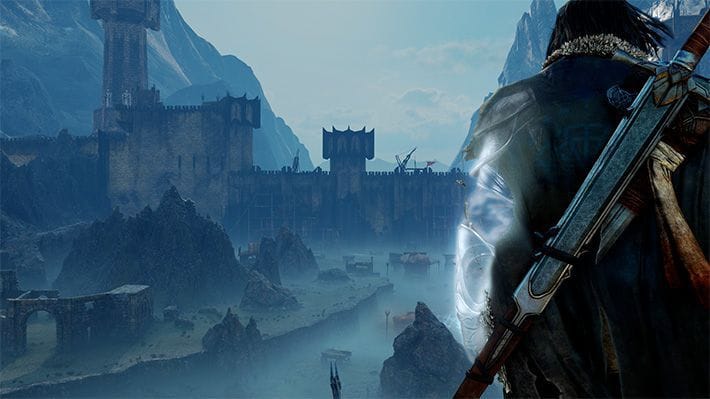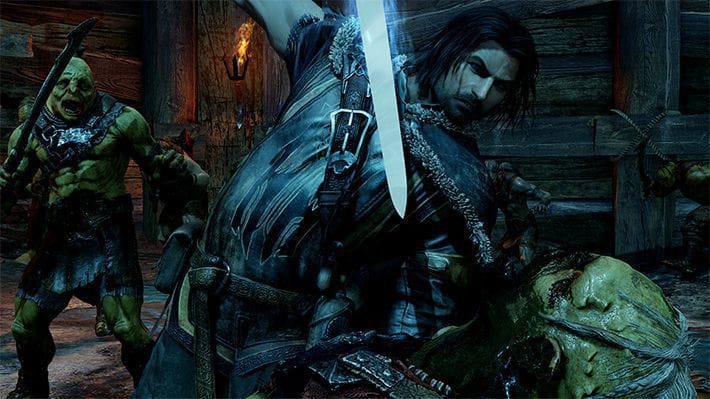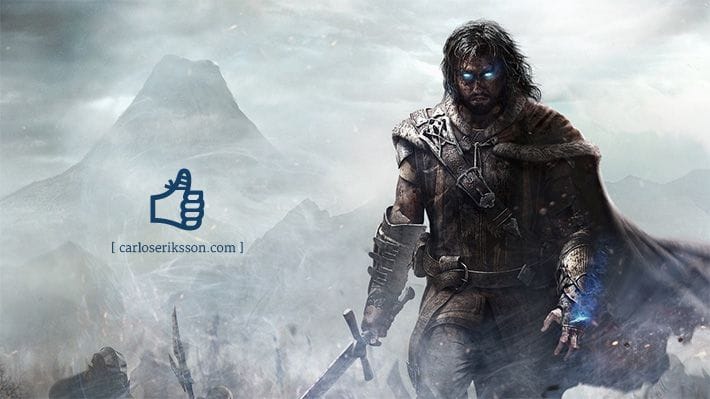He is vengeance. He is the night. He is Bat— Huh? Oh, right. He is not Batman. He is some guy named Talion. Some guy who quite clearly isn’t Batman.
How do I know that?
Because the first thing Talion decides to do, is die.
Which is very distinctly un-Batman of him.
As his entire family is slaughtered—super emotionally—in front of his very eyes and he, himself, is about to have his throat slit, he is given a blood curse—or something, I’m not really sure because I kind of zoned out at this point—and instead of dying his soul is fused with some other guy.

After that, his throat is very much slit and he dies but doesn’t really die.
Confused?
Don’t worry. Whilst I’d love to tell you that the story is one of great excellence and depth, told beautifully and with great care, I can’t. Because it isn’t.
The story is meh at best and completely forgettable the rest of the time.
Which is why you don’t need to worry about it.
Dead wife and family blah blah. Something about revenge. Yadi-yadi-ya. Nobody really cares. You get the idea.
Middle-Earth: Shadow of Mordor is as if developer Monolith took two completely separate games and stuck them together with the glue that is the Nemesis system. You spend the first half of the game cursing at your own incompetence as Orcs kill you because, most of that time, you’ll have no one to blame but yourself.
Or in my case, 10 minutes into the game, stumbling into a group of Orcs fighting a rampaging Graug. With a deranged sense of grandeur I ran straight into the thick of it, only to realize moments later that I was in fact the least scariest thing around.
So I turn around to run away.
This is the point where I meet my first and most persistent nemesis, an ass hole named Kâka Runny-Bowels, who glances my departure and precedes to put an arrow in my newly resurrected back.
Captain Runny-Bowels managed to kill me a couple of times before I learn to avoid large fights and take my time sneaking around instead.
But I slowly get the hang of it, not running into hordes of Orcs obviously helps, and I become more and more formidable as time goes by.

I’ve run into Kâka a few more times, even managed to burn and mutilate him but unfortunately if you don’t cut their heads of, they—just like you—come back.
Which brings us to the second half of the game where, after having acquired the ability to “brand” enemies, you go from Talion Slayer of Orcs to Talion Breeder of Orcs.
In a brilliant twist of gameplay the strengths—from carrying a massive shield to being invulnerable to ranged attacks—you loathed so much, is now the traits your trying to collect and nurture for your super-Orcs.
He called himself, Mûglûk The Disgusting, a thick-skulled Orc with boils and third-degree burns who would only speak in single syllables, “Fight. Now. Crush. Skull.” And he quickly became my favorite pet.
Sadly he met his early demise when I sent him to murder Pushkrimp the Poet, a rhyming bastard who apparently could shot explosive arrows.
“Maybe I should have found out Pushkrimp’s weaknesses before I sent Mûglûk to his fiery death,” I thought to myself as I stood there with my hand on Pushkrimp’s face, entering his fragile Orc mind and forcing him to join my cause, “Huh, scared of Ghouls? Who would have known?”

In short, Middle-Earth: Shadow of Mordor is a hilariously fun and chaotic Orc breeding simulation.
And for those who have little interest in the world of Tolkien, this is a great game that can easily stand on its own, not requiring an intricate understanding of the vast mythology that Tolkien has created.
Would definitely recommend.